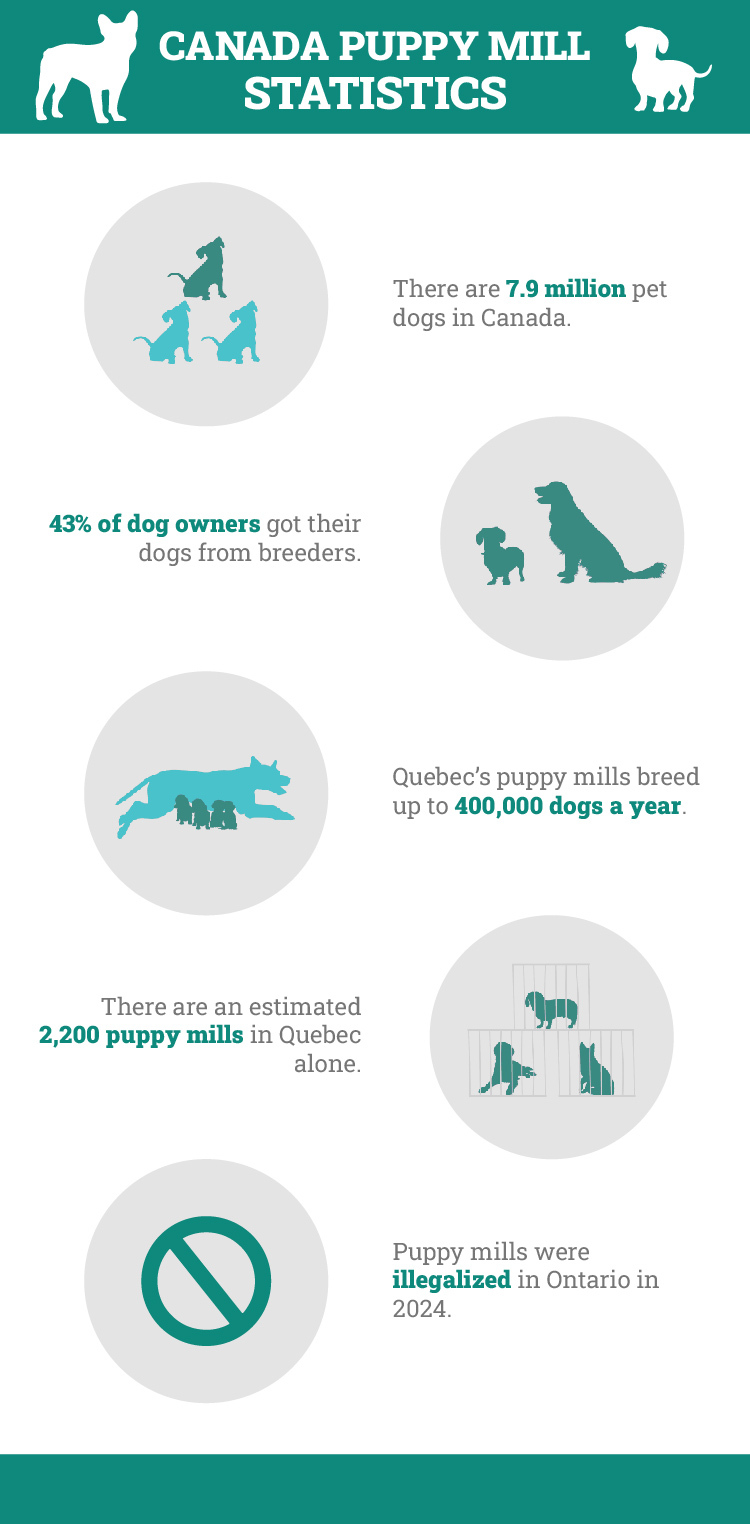In this article
View 4 More +Note: This article’s statistics come from third-party sources and do not represent the opinions of this website.
Canada has a population of approximately 7.9 million pet dogs, which means that cats are the more popular pets, at least in terms of population size, although it is likely that more households own dogs than cats.
Puppy mills are mass breeding facilities, where dogs are kept in atrociously poor conditions and rarely, if ever, get medical attention, socialization, or even exercise. Breeding females are forced to pump out two litters a year and such are the poor conditions that the dogs are kept in, they only have a lifespan of a few years.
There are no national laws that prohibit the establishment or running of puppy mills, although Ontario has introduced laws in an attempt to curb the problem and reduce the negative impact puppy mills have on the population of pet dogs.
Below, we look at 10 statistics related to puppy mills in Canada. However, because they do not have to register, and most puppy mills attempt to exist away from the gaze and scrutiny of authorities and the media, it can be difficult to provide precise, accurate figures.

The 10 Canada Puppy Mill Statistics
- There are 7.9 million pet dogs in Canada.
- 13% of Canadian dog owners got their dogs from pet stores.
- 43% of dog owners got their dogs from breeders.
- 2 million puppies are bred in North American puppy mills every year.
- 90% of all puppies sold in pet stores are bred in puppy mills.
- Puppy mills were illegalized in Ontario in 2024.
- New laws mean puppy mill owners can be fined up to $25,000.
- Ontario only has around 100 inspectors to deal with puppy mills.
- There are an estimated 2,200 puppy mills in Quebec alone.
- Quebec’s puppy mills breed up to 400,000 dogs a year.


Canadian Dog Population
1. There are 7.9 million pet dogs in Canada.
(Statista)
Although there is a slightly larger population of pet cats, Canada is home to a population of around 7.9 million pet dogs. Dog owners tend to own fewer dogs, which means more households own dogs than cats.
Population figures have risen considerably in the past couple of years, although they have plateaued in the past year as people are feeling the financial pinch and as more people return to the office or other physical locations to work.
2. 13% of Canadian dog owners got their dogs from pet stores.
(Research Co)
When it comes to where pet owners got their dogs, 13% of dog owners report getting their canine companions from pet stores. Although some pet stores are responsible sellers, many get their dogs from known puppy mills because the mills offer bulk quantities at low prices.
Owners that do get their dogs from stores are encouraged to use those that practice responsible buying, or that operate as satellite adoption centers. Satellite adoption centers offer pets for adoption from shelters and rescues, meaning that owners can adopt rather than buy. Not only does this cut down on the number of puppy mill puppies purchased, but it reduces demand for them and helps a dog in need of rehoming.
Most rescue dogs have also been neutered or spayed, microchipped, and had some degree of veterinary care before the new owner receives them.

3. 43% of dog owners got their dogs from breeders.
(Research Co)
In contrast, 43% of dog owners report buying their dogs from breeders. Although there are plenty of reputable breeders out there, if a prospective buyer doesn’t do their due diligence or at least check the property where the dogs are bred, there is a chance they are buying from a puppy mill.
Reputable breeders will ensure that parent dogs are screened for common health problems. Conditions for the puppies and their parents will not be as bad as in puppy farms, either.

Puppy Mills
4. 2 million puppies are bred in North American puppy mills every year.
(Canada Pet Care)
Puppy mills do not register with local authorities and most operate covertly, trying to keep their practices out of the public eye. As such, it is impossible to know exactly how many puppy mills there are.
However, estimates suggest that approximately 2 million puppies are bred in North American puppy mills every year and that these dogs are then transported long distances in equally poor conditions before being sold in stores or online.

5. 90% of all puppies sold in pet stores are bred in puppy mills.
(Canada Pet Care)
A lot of reputable and responsible pet stores only sell pet supplies and do not sell pets themselves. Others operate as satellite adoption centers for rescues and shelters, providing details of abandoned dogs in need of homes.
Of those who do sell puppies, it is believed that at least 90% of those puppies came from puppy mills in the first place. Puppy mills sell to stores because they typically take litters of puppies at a time, and the stores buy from puppy mills because the animals are cheap and easily obtainable.

Ontario Laws
6. Puppy mills were illegalized in Ontario in 2024.
(Global News)
No Canadian federal laws are preventing the establishment, running, or use of puppy mills in Canada. However, Ontario became the first province to take steps to try and prohibit these inhumane centers.
In 2024, the Preventing Unethical Puppy Sales Act (PUPS) Act was passed into law, which makes it illegal to run and operate puppy mills. Following criticism of the original proposal, the new laws have been beefed up, but critics argue that it will do little to dissuade people from setting up puppy mills because of the potential profit they can bring and because of how difficult it is to police them.

7. New laws mean puppy mill owners can be fined up to $25,000.
(Global News)
Under previous animal welfare laws, those found guilty of animal cruelty were typically met with fines of between $200 and $500. The new PUPS act makes inbreeding illegal. It also restricts how often dogs can be bred, with females only allowed to produce three litters in any two years and preventing females under one year from being bred. It is also now illegal to act as a broker for puppy mills, which means pet stores selling puppy mill puppies could be found guilty of animal cruelty.
Anybody found guilty of breaking the new laws will be faced with a minimum $10,000 fine. The maximum penalty is $25,000 if a dog dies as a result of the cruelty, and the fines are per dog, which means they can add up to substantial fines.
8. Ontario only has around 100 inspectors to deal with puppy mills.
(CBC)
Critics of the new act say it will make little difference because it is so difficult to initially find the puppy mills and then investigate and prosecute. Ontario’s Animal Welfare Services is the group responsible for this, and they only have around 100 inspectors.
The new rules have not set aside any new money or new inspectors to help adequately investigate or prosecute puppy mills.


Quebec Puppy Mills
9. There are an estimated 2,200 puppy mills in Quebec alone.
(HSI)
Quebec is described as the puppy mill centre of Canada, and it is estimated there are around 2,200 puppy mills in the province. The high number is because until recently, Quebec did not have any animal welfare act and there were minimal laws that could be used to prosecute or control inhumane breeding.
Only in 2005 did Quebec introduce an animal welfare act, which allows inspections of breeding operations without the need for a warrant and includes provisions for fines of up to $15,000 for those found guilty of inhumane breeding.

10. Quebec’s puppy mills breed up to 400,000 dogs a year.
(HSI)
Quebec has such a problem with puppy mills that it is estimated that mills in the province breed up to 400,000 puppies every year. These puppies are then shipped to Canada, and some to the US, for sale in stores and online.
As well as enduring appalling conditions during breeding and when they’re born, the journey can take days in very poor and harrowing conditions.

Frequently Asked Questions (FAQ)
What are puppy mills?
Puppy mills are breeding facilities that are created purely to produce as many puppies as possible at as low a cost as possible. Owners typically ignore animal welfare and put profits first, which results in animals living in very poor conditions, being bred too frequently, and the lives of the dogs being put at risk.
How can you recognize a puppy mill?
Unfortunately, it can be difficult to determine the source of puppies when they are purchased from pet stores or online. And puppy mill owners will take steps to hide their operations, including having potential owners meet them in secondary locations to meet the puppy or complete the sale.
Prospective buyers should always ask where puppies came from when buying, and if they are buying from a breeder, visit the site. If this isn’t possible, walk away and either look for a reputable breeder or consider adopting rather than buying.

What’s wrong with puppy mills?
Puppy mills are set up solely to make money from the breeding and sale of puppies. Adult and young dogs are mistreated and kept in poor conditions before often undergoing long and difficult journeys.
Because the dogs are usually inbred and parents have not undergone any health screening or health checks, the puppies can end up very ill, which means buying a puppy mill puppy is also bad for the owner.
Are puppy mills illegal?
There are no federal laws that strictly prohibit the running of puppy mills in Canada. However, provinces are slowly introducing laws of their own.
Ontario most recently established the PUPS act which enables prosecutors to fine puppy mill owners a minimum of $10,000 per dog in their care, up to a maximum of $25,000 per dog, if those dogs die. The fines are levied per animal, which means a typical puppy farm could face fines of hundreds of thousands of dollars.

Conclusion
Puppy mills produce hundreds of thousands, if not millions, of puppies every year in Canada alone, with Quebec being considered the puppy mill center of the country. Due to the poor conditions the puppies and their parents are kept in, dogs from these mills tend to be very unhealthy but they can be difficult for prospective buyers to avoid as they find their way into pet stores and are routinely sold online.
Although laws are being introduced to help combat the problem, provinces lack the funding to really investigate prospective puppy mills and prosecute their owners, which means they will continue to be a problem in the country.






















